FEATURE: Japanese Teen Fashion Unspun: The Rise and Fall of SPINNS in Harajuku
For the first time in twenty years, Tokyo’s youth culture mecca Harajuku has no Spinns.
Special Guest Post by TokyoFashion
Japanese youth fashion chain Spinns celebrated their thirtieth anniversary in September 2023. The much-loved brand hosted in-store parties, sales, and special events at their shops all across the country. But there was no celebration in Japan's capital of youth culture, as Spinns shocked their young fans by suddenly closing their last remaining Harajuku shop in late August. Instead of cheering for thirty years of fashion and fun, customers in Harajuku found themselves adrift without a single Spinns shop for the first time in two decades.
If you aren't a Japanese teen (or haven't been one), the name Spinns might not be familiar. Spinns is one of two brand names known by every trendy fashion-loving Japanese teen. The other brand is WEGO, Spinns main competitor. Together, these two nationwide chains control the "Harajuku style" and "trendy American casual resale" market for Japanese junior high school and high school students. They are Japan's top two local fast fashion brands targeting exclusively trendy low-budget young people with an interest in Harajuku styles. But, Spinns and WEGO are more than fast fashion. Both specialize in cheap resale fashion as well as producing their own in-house brands, collaboration items, select items from other brands, and culture and lifestyle goods. As everything is targeted at teens, goods are cheap - with the average price of Spinns and WEGO items coming in at 3,000 to 5,000 yen ($20-$35 USD).
For kids in Japan, "Harajuku" is more than just a physical neighborhood in Tokyo. It's an incredibly powerful brand on its own. Spinns and WEGO trade on the power of the "Harajuku" brand to sell trendy goods to teens all over the country. In some ways, Harajuku is a stronger brand in rural areas than it is to Tokyoites. For young people living far from anywhere cool, Harajuku represents the dream of a more fun and more fashionable life in the same way that Los Angeles or New York might represent a better life to an American kid growing up in rural Kansas. Spinns and WEGO (along with thousands of other brands) are aware of Harajuku’s power to inspire the imaginations of Japanese teens, so it's critical for their business that they maintain a strong link to the neighborhood.
In the Beginning
Spinns started life as "a single cart/stall in a corner of a fashion building in Kyoto in 1993". The name "SPINNS" comes from the founder's original intent to "create a store where culture swirls" and the brand's famous motto is "ATTITUDE MAKES STYLE". From its humble Kyoto beginnings, the brand expanded outward - opening shops all over Japan.
Spinns' parent company Human Forum appears to have made their first foray into Harajuku in December of 2003 with device.TOKYO - an edgy select shop whose support for emerging designers quickly made it a favorite of Harajuku hipsters. Evolving as quickly as the neighborhood, device.TOKYO was reborn as the popular Harajuku boutique Monomania by 2008. Monomania exploded into an instantly recognizable "Harajuku" brand, spawned several imitators, and was frequently seen in trendsetting Japanese street style magazines like FRUiTS and TUNE for the next decade.
According to a company announcement, Human Forum's first resale shop in Harajuku opened sometime in 2003 or 2004. Operating out of the basement of a building near Harajuku's famous Jingumae Crossing intersection, "Resale Clothing Shop Honpo Tokyo" didn't use the Spinns name at all at first. Just as device.TOKYO had evolved into Monomania, by summer 2008 "Honpo Tokyo" was reborn as "Spinns Harajuku Resale Shop”. Thus, the "Spinns" brand name began its remarkable journey into Harajuku history.
To observers in 2008, Spinns seemed to be simply one of many trendy Harajuku clothing stores marketing to cash-strapped Japanese teens. But behind the scenes, several seemingly unrelated things were in motion that would change the course of Harajuku history, with Spinns in a central role. Steve Jobs introduced the first iPhone in 2007, kicking off the social media era. At the same time, Yusuke Nakagawa founded Harajuku culture-focused Japanese talent management company AsobiSystem, and Sebastian Masuda, having spent more than ten years years honing his unique kawaii aesthetic running his small Harajuku boutique 6%DOKIDOKI, was looking for opportunities to expand his creative vision.
A few kilometers to the South of Harajuku, Shibuya's gyaru culture was disappearing, leaving young people looking for the next big thing. In 2009, a Japanese teenager calling herself Kyary Pamyu Pamyu appeared on the scene, experimenting with Harajuku fashion while attending high school in Tokyo. All of these threads - along with a terrible earthquake - would eventually converge into a once-in-a-generation pop culture moment, with Spinns playing a pivotal role.
The Spinns Era
2010 was the real beginning of the Spinns Era in Harajuku. The giant "Spinns Harajuku #1" store opened in November with great fanfare in a prime location - along Harajuku's main thoroughfare Meiji Dori, right next door to global fast fashion titans Forever 21 and H&M. A newly energized Spinns declared they were on a mission to cultivate and promote Harajuku culture and fashion, not just sell clothes. The new store featured a huge selection of cheap trendy vintage fashion, lots of exclusive Spinns brands like Namaiki and Remade by Spinns, and an entire corner dedicated to promoting quirky young Japanese designers. Spinns new goal was clear, if lofty - to transcend the role of a shop and become a pillar of Harajuku culture.
The moment the Spinns #1 store opened in 2010, it became impossible to ignore the brand's presence in Harajuku. From the giant constantly-changing billboard above the new store in the center of town to the sold out fashion shows they held at Harajuku live houses to magazine models they hired as shop staff to in-store events with top musical acts, idols, artists, and designers to the additional shops they unveiled (some branded Spinns, some under other names), Spinns seemed to be everywhere in Harajuku all at once. The brand's love for Harajuku wasn't just for the locals either - Spinns promoted Harajuku culture enthusiastically to teens all over Japan through a growing network of stores. Kids were so excited that Spinns went from just chasing trends to a new era where they were influencing teen fashion trends on the streets of Harajuku and all over Japan.
It was at Spinns Harajuku Fashion Festivals in 2010 and 2011 that Kyary Pamyu Pamyu (already gaining in popularity from her appearances in teen fashion magazines) began her long association with the brand. Regularly featured in Spinns fashion shows and in-store events in the year leading up to the breakout success of "PonPonPon", Kyary signed on with AsobiSystem - a talent company that managed several other popular models working as Spinns shop girls at the time. After "PonPonPon'' blew up, this group of models (led by Kyary herself) would dominate the next few years of Harajuku culture, placing both Spinns and AsobiSystem at the forefront of Harajuku's first social media generation.
While the iPhone had already been available in Japan since 2008, modern social media (sorry Mixi) wouldn't take off in Japan until the devastating Tohoku Earthquake and Tsunami struck on March 11, 2011. That single tragic incident pushed much of Japan, especially the younger generation, onto Twitter - one of the only communication systems that remained available when voice and text messaging went offline for hours after the earthquake. This launched the international social media era in a country that had almost completely ignored MySpace, Facebook, and Tumblr. After the earthquake, Spinns, AsobiSystem, 6%DOKIDOKI, Kyary Pamyu Pamyu, and other Harajuku entities banded together to organize relief efforts for those who had been displaced. Japan entered a period of mourning, and the fun times in Harajuku seemed like they might be over.
But almost exactly four months after the devastating earthquake - with many in Japan desperately looking for something positive to take their mind off of the long period of national sadness, and the Japanese public further exploring their recent embrace of Twitter - the "PonPonPon" music video was released into the world. International attention was focused on Japan after the earthquake, while Lady Gaga’s “Born This Way” topped the charts and awakened a global excitement for outrageous fashion. Kyary's quirky cuteness combined with Yasutaka Nakata's catchy music and Sebastian Masuda's over-the-top kawaii aesthetic became an instant - and totally unexpected - hit in Japan and around the globe. The success of "PonPonPon" made a superstar out of Kyary - and ushered in a new era for Harajuku.
The Kyary Pamyu Pamyu years were great ones for Spinns in Harajuku. They opened more shops and brands, hosted parties and DJ events inside and outside of their stores, sold out of collaboration items, and became the landmark must-see brand for Japanese teens visiting Harajuku. Japanese fashion icons like Kyary, Dempagumi, AmoYamo, and Tsubasa Masukawa regularly appeared at Spinns as well as in the giant billboards above the Spinns shops. At one point in 2013, Harajuku had four separate Spinns-branded shops open at the same time, along with several other stores managed by the brand under different names. Spinns had indeed become more than just another shop. They helped usher in a new age, and in doing so became a celebrated part of Harajuku culture - just as they had promised in 2010.
All Things Must Pass
But Harajuku is legendary for how fast trends change on the street. While Spinns boomed during the Kyary era, WEGO (still their #1 competitor in Harajuku and nationwide) was expanding their business and building a foundation for what would become the next major era of Harajuku culture. WEGO's in-house brands WC by Chinatsu Wakatsuki and Punyus by Naomi Watanabe grew, while fans of some of Spinns brands - like Monomania and Gallerie - were aging out of the teen fashion scene. In 2014, a Super WEGO Harajuku shop girl named Peco met her future husband Ryucheru while working at the shop. Peco and Ryucheru would soon explode into the next major Harajuku icons after Kyary. By 2016, daily Google searches in Japanese for "Peco" surpassed those for "Kyary" (a trend that continues to this day).
Undeterred, Spinns continued to build and expand - opening Harajuku shops dedicated to Korean fashion, otaku/anime fashion, high-end vintage fashion, and even a sweets cafe. At the same time, observers couldn't help but notice that some of the Spinns-branded shops in Harajuku began to disappear. By the end of 2013, the giant Spinns 1 had been replaced by a new Spinns shop along the famous Takeshita Dori. Though located in a prime location inside of a brand new building, Spinns Takeshita could never match the scrappy personality of Spinns 1, which had been housed in a funky cavernous 1960s-era building. Seeing an opportunity, WEGO quickly opened a new branch in the same space that Spinns 1 vacated - gaining not only some of Spinns previous customers, but also the cool of that original location.
Eventually it became obvious that more Spinns shops were closing than opening, and by the end of summer 2018 the original Spinns Tokyo Main Store, Spinns 2, Spinns 1, and Monomania were all gone. Spinns Takeshita (the main Spinns store in Harajuku by this time) and 2.5 Spinns (a shop dedicated to otaku culture) still stood, but even the giant 2.5 Spinns fell in the summer of 2020. After those years of growth and fun, the landscape returned to what it looked like roughly 15 years before - one single "Spinns" shop remained open in Harajuku.
The lone Takeshita Street Spinns appeared to do well in 2023 - regularly packed with customers, staffed by popular Harajuku kids, and with a refreshed interior design. So, in August, when the brand posted a social media announcement that the last Harajuku Spinns would be closing before the end of the month, the news was met with shock and sadness by staff and customers alike. Spinns fans are young, and the brand concept is largely based around Harajuku culture. How could Spinns exist without a presence in Harajuku, and how could Harajuku exist without Spinns? In the announcement, Spinns recommended that customers start visiting the Shibuya store (only a few kilometers away), but they weren't clear on what Spinns future plans for Harajuku were, if they have any.
At the same time Spinns was winding down in Harajuku, their main competitor WEGO continued its expansion - both in Harajuku and nationwide. On the strength of their own Harajuku boom era, new WEGO shops opened one after another. WEGO became the cool place to work. They were the ones hosting big events, celebrity collaborations, and famous shop staff. The one-time close-in-size competitors were not quite so close anymore. As of September 2023, Spinns still has an impressive 60+ stores nationwide and employs 600 people. In contrast, WEGO has grown to 172 stores and 2,500 employees. Perhaps more worrying for competitors, WEGO recently announced a major investment by Japanese apparel giant Onward Holdings (a conglomerate with over a billion dollars USD in sales per year) that will see Onward become a 20% owner of WEGO with an eye on market expansion.
The factors behind Spinns sudden Harajuku retreat are more complicated than just their direct rivalry with WEGO. Other Spinns competitors include teen trend shops like Romantic Standard, ME Harajuku, and Thank You Mart, as well as Harajuku's huge selection of resale/vintage shops - including Kinji, Chicago, Santa Monica, Flamingo, and Jam. Ecommerce sales and flea market apps have also made it increasingly more difficult for physical stores to turn a profit.
When it comes to trends, Spinns and WEGO have long held a competitive advantage over Harajuku outposts of giant international fast fashion brands like Forever 21, H&M, and Zara. The smaller Japanese shops were extremely quick to respond to trends on the street in fashion-forward Tokyo neighborhoods like Harajuku and Shibuya, staying ahead of their bigger rivals by creating two-way relationships with their customers. This was accomplished by hosting special events, encouraging customers to visit shops to meet their favorite magazine models, and hiring shop staff who acted as both style icons and face-to-face PR people for the brands.
With the rise of social media - and more importantly algorithm-driven fast fashion like Shein and Timu - the local advantage has partially disappeared. Today's Japanese teens - just like teens elsewhere in the world - get their inspiration from TikTok, Instagram, and other social networks. Shein/Timu's algorithms can pick up a micro-trend and copy it before humans are even aware it's happening. If the machines do somehow miss a burgeoning trend, it only takes Shein/Timu a day or two to catch up, then quickly undercut everyone else selling similar items. This switch from human-first fashion to algorithmic fashion has made business more difficult for all brick and mortar shops, including Spinns and WEGO.
The advantage that Spinns and WEGO retain is that they're active participants in the local Harajuku community - hosting in-person events, creating spaces for customers to meet not just celebrities but also other customers with similar interests, and cultivating shop staff who act as style consultants while making real personal connections with customers visiting the stores. Responding to trends quickly and offering the lowest possible prices makes online algorithmic fast fashion tough competitors, but human-driven retail still has a place in the Harajuku community and likely will for the foreseeable future.
Spinns and WEGO remain Japan's top two cheap trendy Harajuku teen fashion brands. Not only have they both spent decades actively participating in the neighborhood's famous fashion scene, they also spend millions of dollars a year promoting "Harajuku" as the definitive cool/fun Japanese lifestyle brand to fashion conscious teens all over Japan.
It's not clear yet what Spinns next move will be. The company continues opening new stores around Japan, as well as sponsoring a week-long Harajuku popup shop for independent designers as recently as early September. It's likely that a chain whose brand and history are so closely linked to Harajuku will be back in the neighborhood sooner rather than later. But for now, a lot of Harajuku teens are feeling lonely in a town without a single Spinns for the first time in their lives.
A Brief History of Spinns Shops in Harajuku
device.TOKYO
Founded by Spinns parent company Human Forum, the select shop device.TOKYO opened in the back streets of Harajuku in December 2003. There was a sister Device store in Kyoto called device.Kyoto. Locals in Harajuku usually referred to the shop as simply "Device". Device carried indie Japanese brands and emerging international designers, hosted popups, and quickly became popular with the cool street style kids. It was similar to Cannabis, LHP, other Harajuku boutiques of the era that stocked emerging/cool brands. Shun Nakagawa, the founder of underground Japanese fashion brand Banal Chic Bizarre (and also the chief editor of TUNE Magazine for several years) shared in interviews that Device was one of the first shops to stock and support his brand. Device changed styles several times in quick succession. By the end of 2008, it had evolved into the monochrome Harajuku boutique Monomania - best known for its in-house brand Yaponski (which was originally sold at device.Tokyo).
Monomania
Monomania Tokyo opened in July 2008, taking the place of device.Tokyo. Its most popular in house brand was Yaponskii, known for monochrome oversized unisex silhouettes with giant t-shirts often featuring their iconic "Yodarebear" character. Monomania and Yaponski were frequently seen in street snaps - and even back page advertisements - in TUNE and FRUiTS Magazines, the legendary Harajuku street style publication founded by Shoichi Aoki. Monomania became an iconic instantly recognizable Harajuku brand with many imitators before closing in July of 2018.
Resale Clothing Shop Honpo Tokyo / Spinns Resale
Spinns parent company Human Forum's first Spinns branded shop in Harajuku appears to have originally opened in 2003 or 2004 as the "Resale Clothing Shop Honpo Tokyo" (Furugi-ya Honpo Tokyo), exclusively carrying trendy low-price vintage and resale fashion. By September of 2008 it was renamed "Spinns Furugi-ya Harajuku" - the first store in Harajuku to use the "Spinns" brand name. The shop was located in the basement of a building that at one time housed a very large shop by Spinns main competitor WEGO. It was always amusing to look at the front of that building and see both Spinns and WEGO's signs together (since they were direct competitors). The Spinns Resale shop is where some of the later-famous models got their start as Spinns shop girls before moving to the giant Spinns #1 shop when it opened in 2010. This Spinns shop remained focused on resale from the time it opened until it closed (after an approximately 14 year run) on 01/14/2018.
Spinns #1
Spinns #1 opened in a huge old building on Harajuku's main street Meiji Dori on 11/20/2010. The store occupied a massive 350+ square meter (3700+ square feet) location on the first floor of the COXY188 Building, right next door to Forever 21 and H&M. The big billboard above the entrance to the Spinns #1 in the center of the neighborhood would become an iconic part of both Harajuku and Kyary Pamyu Pamyu history. Brightly colored signs, sometimes with humorous messages or graphics, announced each of Kyary's new singles and tours, as well as promoting Spinns related events. The shop that kicked off the Spinns Era remained open until 09/23/2013, a few weeks after the opening of the new Takeshita Dori store on 09/06/2013. After Spinns #1 closed, WEGO moved into the space - an example of the highly competitive relationship between Japan's top two Harajuku-themed teen fashion brands.
Spinns #2
Spinns 2 opened on 12/21/2012 in a prime location on Meiji Dori, on the south side of Forever 21 and H&M, just down the street from Spinns #1. The shop was downstairs in a large basement floor and the walls were covered in "Spinns" related paintings by Japanese artist Chocomoo. This Spinns location hosted DJs, live painting, and other events on the street in front of the store. They were perhaps most famous with tourists for the big 3D sticker-covered "Harajuku" kanji sculpture outside of the store that would become a Harajuku selfie landmark. That 3D Harajuku was also used as a DJ podium when they hosted parties. Spinns 2 closed on 02/07/2016 and Spinns-owned brand Gallerie Tokyo opened in the same location a month later on 03/02/2016.
Spinns Takeshita Dori
The Spinns store on the famous Takeshita Dori shopping street became the "main" Spinns in Harajuku when it opened on 09/06/2013, replacing the previous main store Spinns #1. Spinns Takeshita opened in the brand new Cute Cube building, an instant Harajuku landmark featuring art direction by Sebastian Masuda of 6%DOKIDOKI/PonPonPon fame. This was the shop that defined "Spinns Harajuku" for most Harajuku kids who came to the neighborhood after the Kyary era. Spinns Takeshita was highly visible, had popular shop staff (many of whom were regularly featured in street style magazines and websites), hosted special events and in stores, and stood toe-to-toe with the many WEGO shops that had opened on Takeshita in the post Kyary era. Spinns Harajuku Takeshita Street closed unexpectedly on 08/24/2023 (announcing the closure on social media only a few weeks before), leaving Harajuku without a single Spinns location.
Gallerie Tokyo
Gallerie Tokyo was a select and vintage shop - with a concept of "a place where fashion addicts gather." They stocked both high-end vintage (Chanel bags, YSL, Prada, etc.) and a lot of Los Angeles indie brands (Vidakush, ESQPE, etc.) as well as hosting international designer popups and in store parties. Founded in Kyoto in 2008, Gallerie Tokyo opened in the Spinns 2 location in March of 2016, moved to a location on Cat Street previously occupied by American Apparel in May of 2018. This location closed down on August 16, 2020. The brand went online only closing completely on January 16, 2022. Gallerie was another community-based brand, like Spinns, but its community was different - older, with sort of a Los Angeles theme, but also expensive Paris vintage (Paris Hilton meets edgy clubwear?).
2.5 Spinns
2.5 Spinns pre-opened in August of 2015 with an official Grand Opening on Christmas Day 2015. The shop was located on the second and third floors of a large building just off of Takeshita Dori. The third floor was a Spinns Cafe produced in collaboration with Sweets Paradise that regularly hosted idol or anime-themed events. The 2.5 Spinns brand concept was "in between 2D and 3D" and they sold fashion, games, toys, and other goods inspired by anime, manga, idol, fandom, and otaku culture. The shop made space for designers who worked in the otaku subculture space with a belief that there was a demand for cool fashion created by real designers inspired by anime and manga (rather than nerdy fan t-shirts).
Japanese brands like Balmung, Chloma, and Hatra had been working in this space for years (as well as underground Tokyo shops like Gokai and Nessin), but they were mostly relegated to "high concept" or "subculture" status. This elite/underground image made the brands appeal mostly to artists or fashion aficionados, so the sales of that original group of brands never broke out of "niche" circles - even when stocked by major retailers or doing fashion shows in Paris.
2.5 Spinns hoped to take this type of otaku-inspired fashion wider, making it trendy and cheap for average kids on the street. It was a brave gamble, but one that probably didn't pay off in the end. While otaku-inspired fashion has boomed in the last few years (sometimes called "Y3K fashion" in contrast to the Y2K boom), it turned out to be another group of very cheap Japanese brands (also heavily inspired by Balmung, Chloma, and Hatra, and riding the coattails of popular idols) that would reap the rewards rather than 2.5 Spinns. If they'd opened a few years later, 2.5 Spinns might have caught the Y3K wave, but they were in the process of closing down by the time that boom really started to take off. 2.5 Spinns moved from Harajuku to a smaller location inside of the famous Nakano Broadway otaku mall in June of 2018 before closing completely in June of 2020.
Chucla by Spinns
Chucla by Spinns was a Korean fashion, cosmetics, and lifestyles boutique that opened in June of 2018 on one floor of the building just off of Takeshita Dori that had been previously occupied by 2.5 Spinns. Chucla was riding one of the many K-Pop waves that regularly sweep through Harajuku. Chucla by SPINNS closed on 04/30/2020 after a two year run just as the pandemic era began. The official reason for closure was "expiration of building lease", but the COVID 19 lockdowns could also have been a contributing factor.
Other Spinns Brands & Related Projects
There were many other smaller Spinns-associated fashion brands (with names like Ponty, Kibunya, HYPHY, Flappers Club, Moshpit, and Namaiki) and one-off collaborations that would come and go with the rise and fall of trends, models, artists, and store staff. There were also numerous projects started by ex-Spinns staffers, from the beloved Harajuku vintage boutique Punk Cake (founded by an ex-Spinns buyer) to Japanese fashion licensing company PonyComb (founded by an ex-manager of Spinns Harajuku).
Namaiki
While short lived, Namaiki was an early brand produced by popular Japanese magazine model (and Spinns #1 charisma staffer) Seto Ayumi. Seto would later go on to create her more well known brand "Aymmy In The Batty Girls" with her management company (and frequent Spinns collaborator) AsobiSystem. Aymmy (which was not associated with Spinns as far as we know) closed in 2019. Seto launched a newer "more mature" fashion brand called Dear Sisterhood.
Park Harajuku
Founded in 2014, Park Harajuku is similar to 2.5 Spinns in that it supports artists and designers working in the otaku culture space. While not a Spinns company, Park has worked with many of the same people as Spinns, and they've had some staff crossover over the years. Whatever their relationship - when 2.5 Spinns opened in 2015, Park moved into the big new building and ran a Park Harajuku shop inside of the Spinns shop. Eventually, when 2.5 Spinns moved to Nakano in 2018, Park moved back into their own space in the back streets of Harajuku, where the tiny beloved shop remains open today.
Milklim
Milklim is another Harajuku subculture brand (like Park) that had some type of shop-in-shop relationship with Spinns. The kawaii Japanese fairy kei fashion brand (in the same genre as Nile Perch or Spank!) was sold at various Spinns Harajuku shops as well as regularly being featured in the official Spinns Harajuku fashion shows during the Kyary Era. After selling at Spinns (and Park) for years, Milklim opened their own boutique near Harajuku's famous Takeshita Dori in April of 2015. Also in 2015, the brand appears to have changed owners with the original founder/designer leaving the company. The Harajuku boutique closed in July of 2016. Milklim announced it would end all operations in 2019.
Shibuya Spinns Shops Bonus
Moohoop Shibuya
Moohoop was a brand/shop Spinns launched in 2011. The "Moohoop" name itself appears to have been in use by Spinns parent company already (for another chain of normal resale shops), but the new brand concept was focused on Shibuya 109 and gyaru culture. Opening just as the gyaru era was ending, Moohoop may now be seen as a proto-Neo Gyaru experiment. The early 2010s was a time in Tokyo when Shibuya's famous Gyaru were quickly disappearing - leaving fashion brands, Japanese media, and the public trying to figure out why, and trying to predict what would come next. "Neo Gyaru", which would become a Japanese media buzzword in 2014, was an attempt by struggling gyaru boutiques/brands/models/media to find a way forward after the fall of their culture (and disappearance of their customers). Coincidentally, Moohoop was launched at almost the exact same time as a then twenty-year-old Alisa Ueno launched her brand Fig & Viper. Ueno would go on to become the face of "Neo Gyaru" in the media in 2014.
Moohoop's brand concept was "NEW MIX STYLE", which meant "Shibuya gyaru culture x Harajuku fashion". Predicting the core concept of Neo Gyaru, it sought to keep the sassy gyaru attitude alive, but soften the aesthetic into something more safe that "normal" trendy teens could wear. The boutique opened on the eighth floor of gyaru-mecca Shibuya 109 to much fanfare - with in-store events featuring famous gyaru Mizukitty and Kumikki along with other trendy models from popular magazines of the era (Egg, Pop Teen, Ranzuki, etc.) But like most of the Neo Gyaru movement to follow, Moohoop didn't take off. By the end of 2012, the shop changed its name to Spinns Shibuya 109. (Other Moohoop locations in Japan appear to have survived a little longer, but also disappeared as the last original gyaru faded away.) While Moohoop came and went a few years too early to fully enjoy the media hype over "Neo Gyaru", their high profile experiments to create and promote trendy styles mixing Shibuya fashion with Harajuku fashion were part of a major shift in Tokyo youth culture happening at the time.
Spinns Shibuya 109
The Shibuya 109 Spinns is the lone survivor in the hip central Tokyo area after the closures of the brand's two other most beloved locations - Spinns Takeshita Dori (closed 08/24/2023) and Spinns Ikebukuro Sunshine City (closed on 08/27/2023). The Shibuya 109 Spinns was redesigned in 2019 to make the shop more social media friendly and to lean into the current Y2K boom, which has seen Gen Z has fallen back in love with Shibuya's (now retro) gyaru culture. Spinns Shibuya 109 is the last hope of young Spinns fans in Tokyo, so there are a lot of people rooting for it.




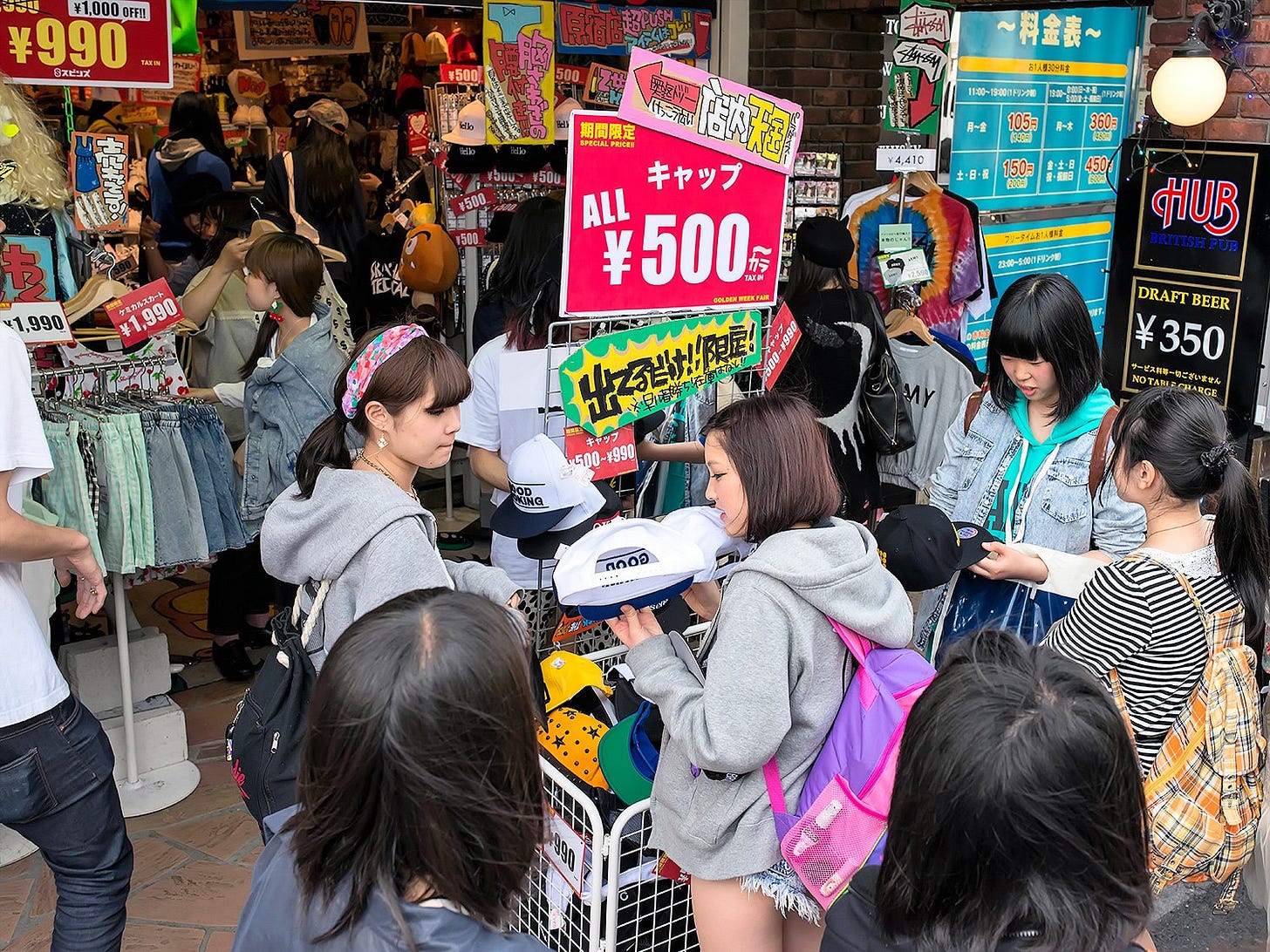


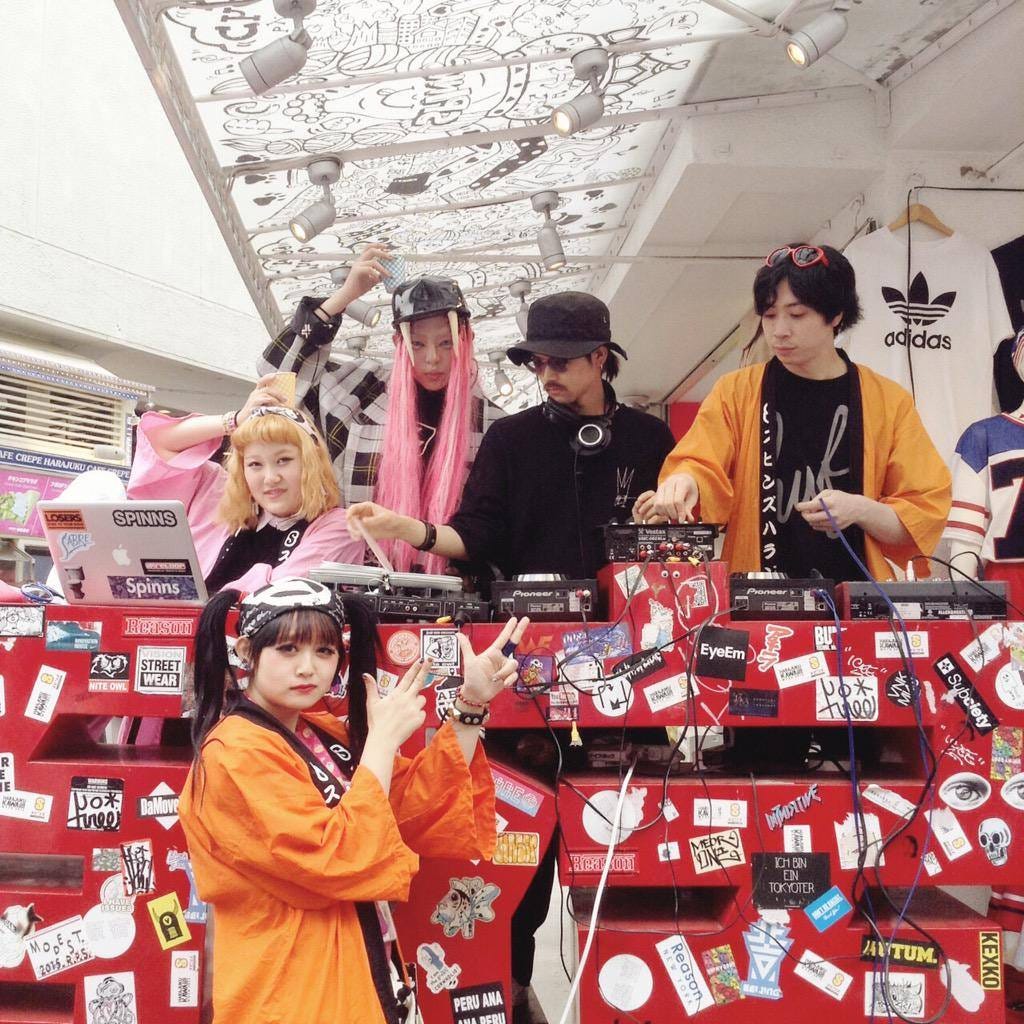
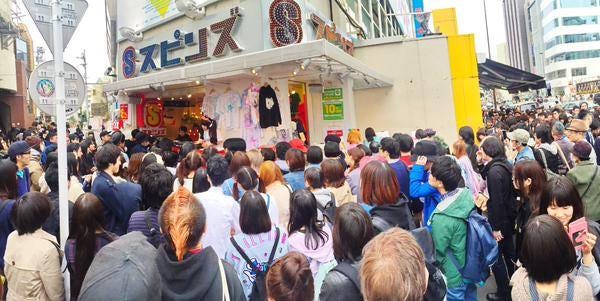
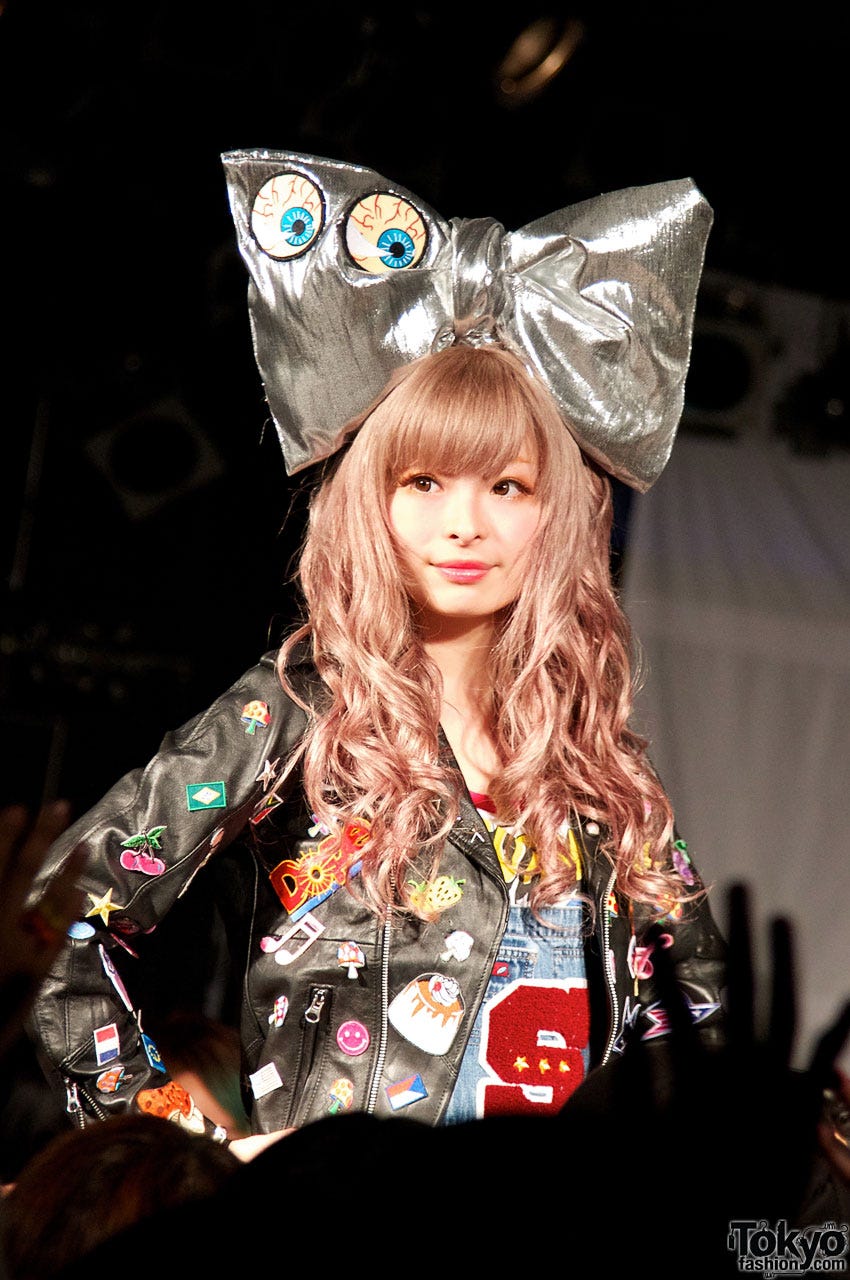

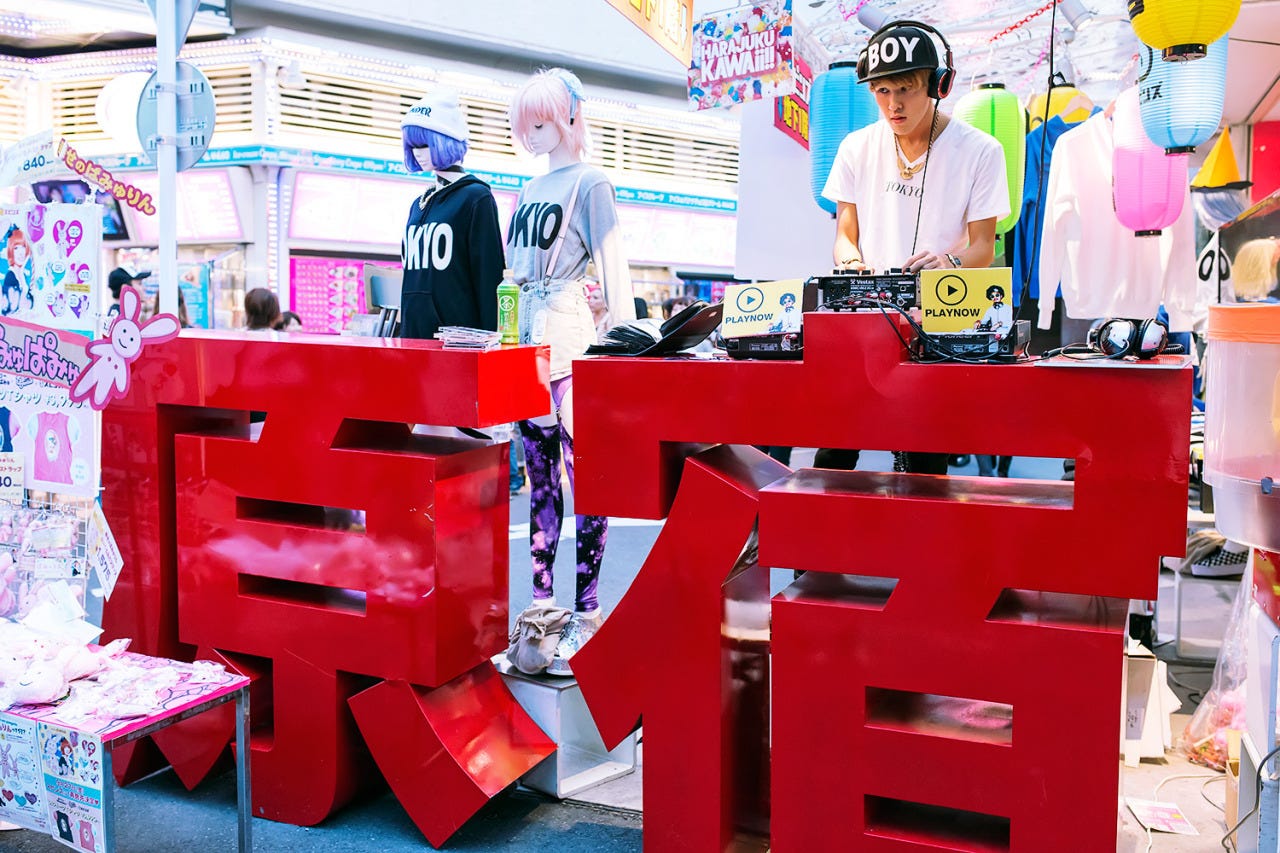

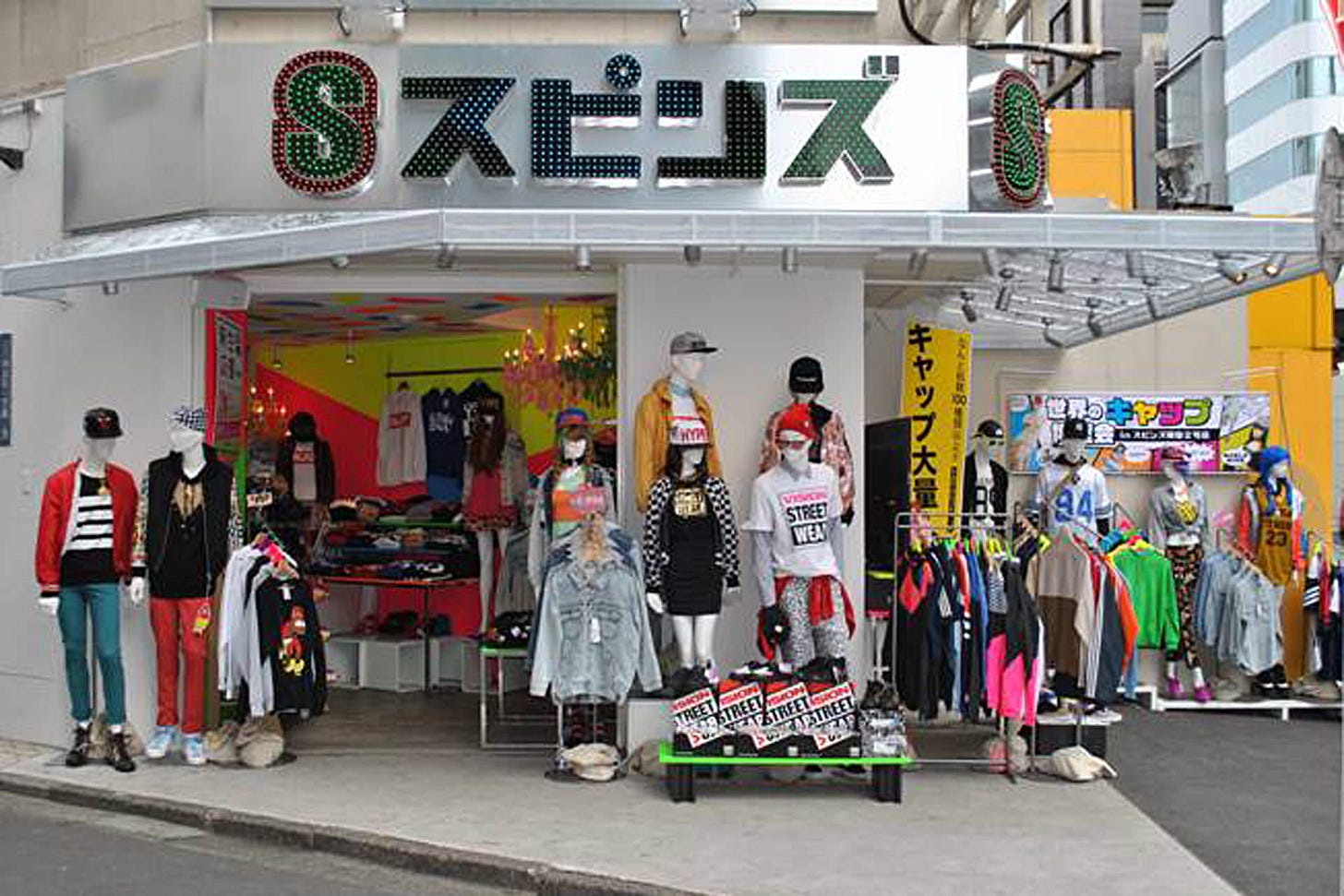


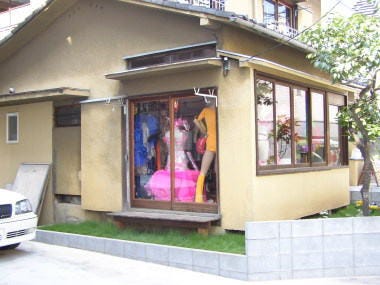


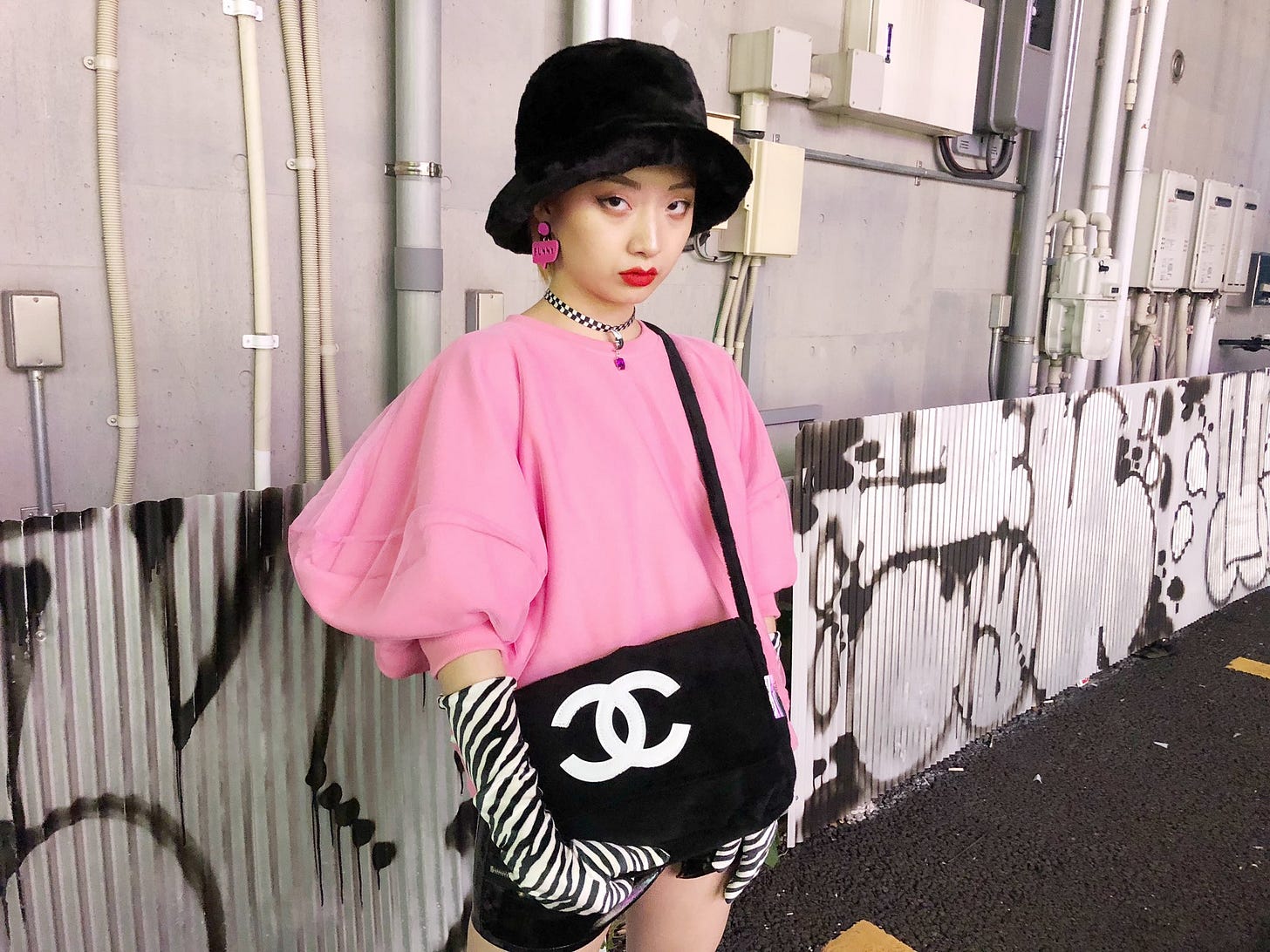
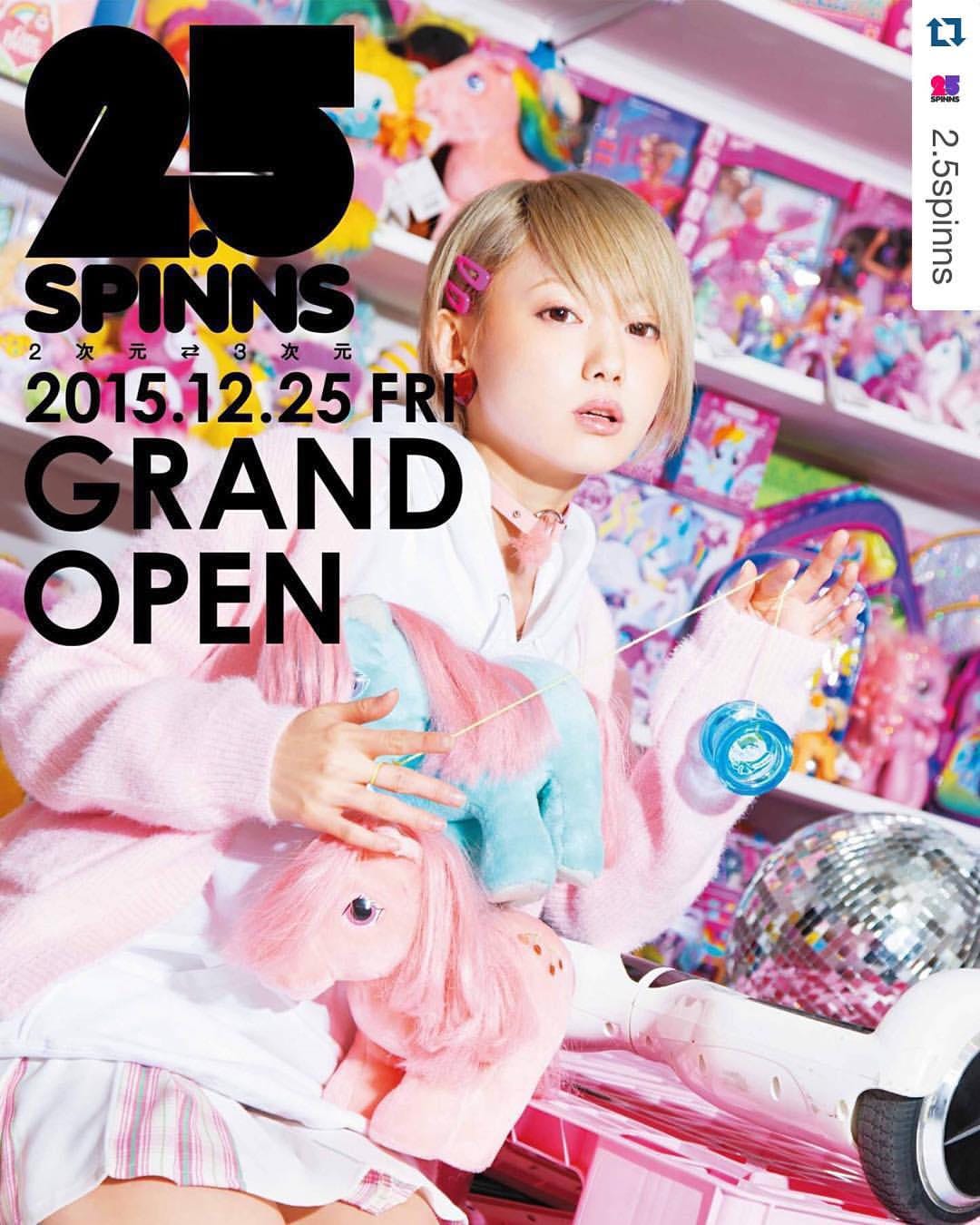
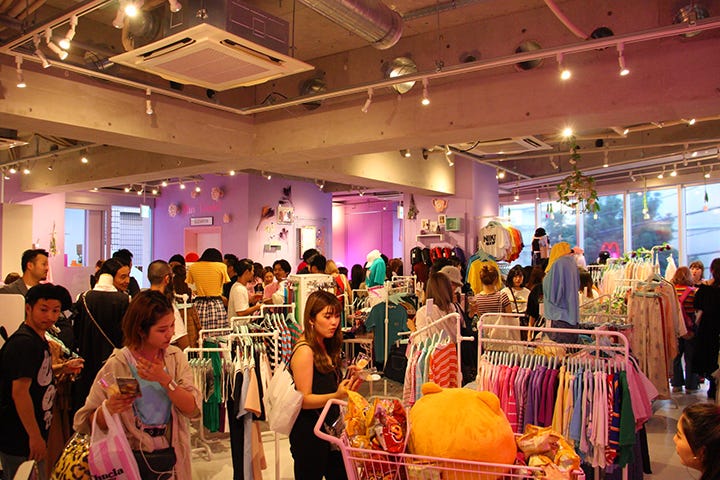
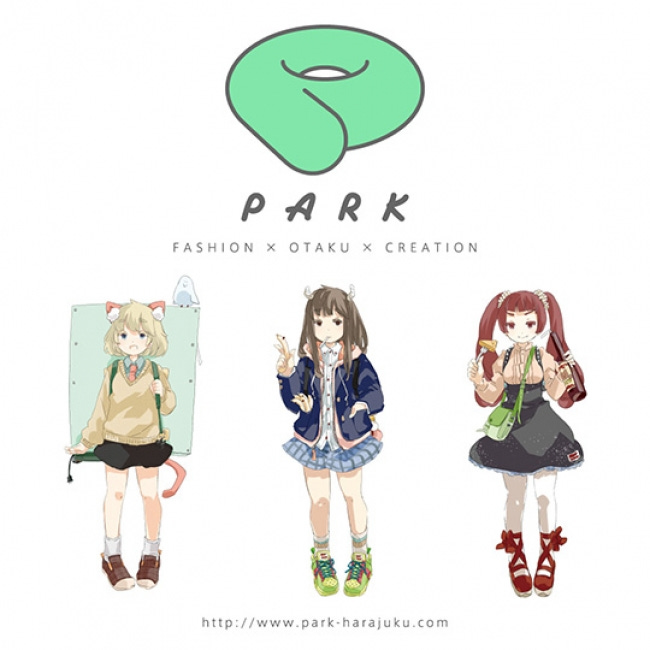
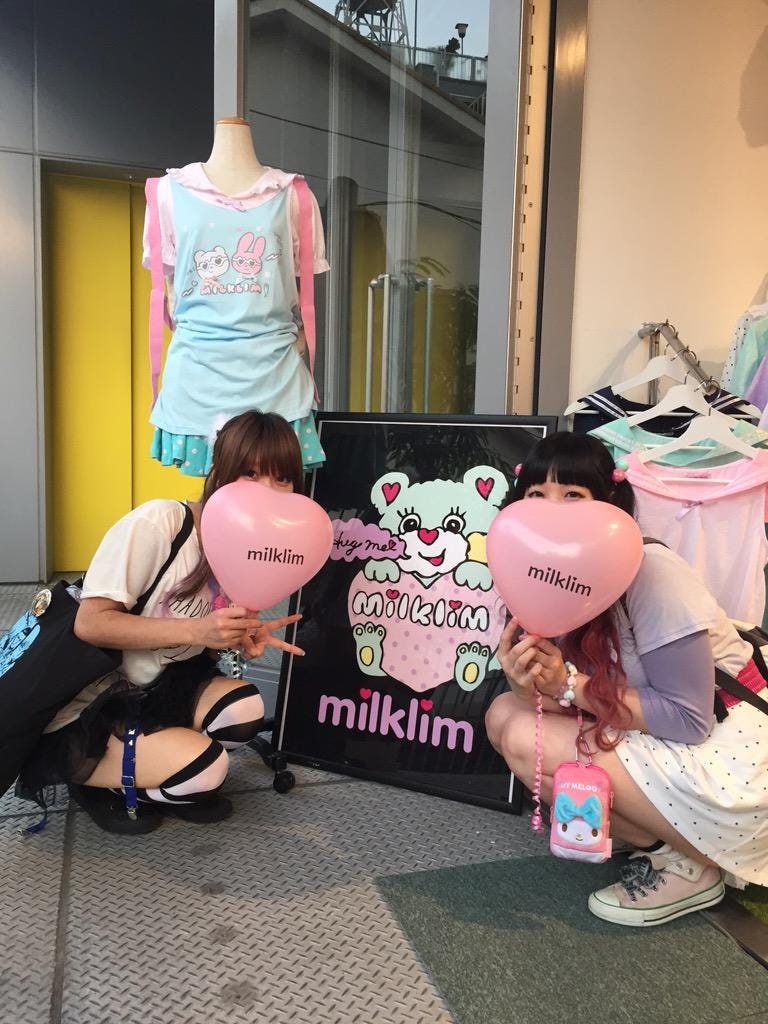

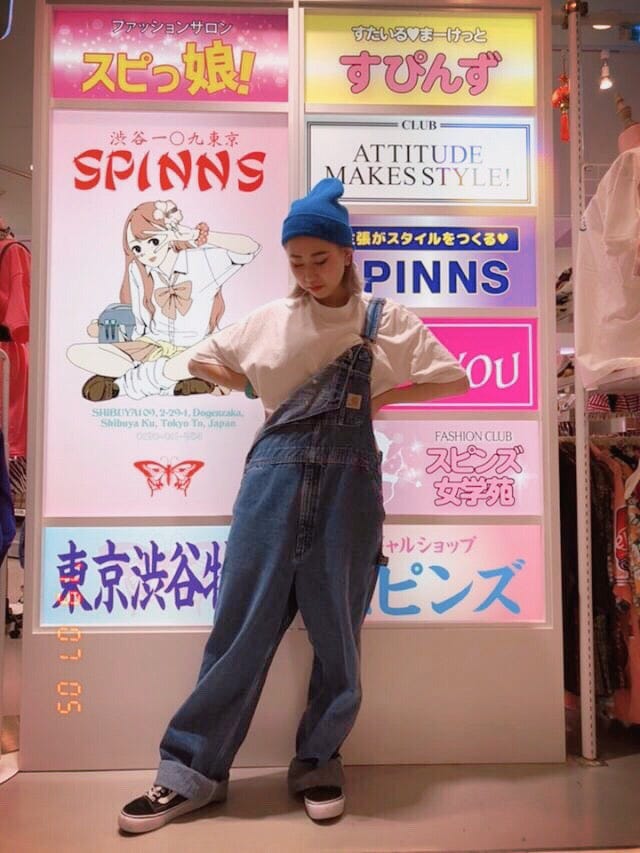

Great post by my old friends at Tokyo Fashion! Magnificent research.